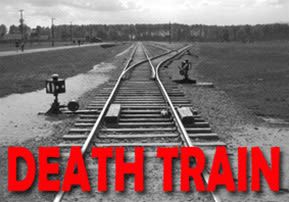
Death Train
At one point, the train stopped in Kashau, Hungary, and in the station a bucket of water was passed into our car. Try to imagine sharing one bucket...

Life and conditions in the ghetto were tense, yet somehow we did not truly realize the danger we were facing. One day, the alarming bellows of the town crier informed us that we were to be transported out of the ghetto and "resettled." Soon afterward, we were given our departure date. Just a few days prior to our departure, the gendarmes told us that we would be taken to a labor camp called Konyormezo, located somewhere in Hungary, where working conditions were not too difficult, and where families would be permitted to remain together. In reality, there was no such place. This fiction was part of the Great Lie invented by Eichmann. (In Hungarian it means "the place of mourning.")
Upon hearing of our destination I felt relieved, believing that I would not be separated from my husband and my esteemed mother. We felt that no matter how difficult the conditions in the labor camp would be, with the help of the Almighty we would survive.
Now, as we gathered outside, the morning sun blazed into my sleepy eyes and I could already feel the humidity rising on that early spring morning. Nobody thought, however, that this would be the last day we would see the sun rise over the Jewish community of Selish — although the gentile townspeople were well aware of this.
We formed lines and were led by the gendarmes through town. A menacing gauntlet of townspeople lined the sidewalks and streets, many jeering and shouting insults as we walked past. Others, however, expressed sorrow and disbelief.
At first we hesitated, shocked by the hostility of the crowd, but our captors prodded us forward. Trying not to look at our tormenters, willing ourselves not to look back, we marched on.
Soon we found ourselves at the train station. Before us stood a long chain of cattle cars, and before we knew what was happening, the gendarmes started pushing us inside them.
We could not have known that this was just the beginning of our nightmare. I found myself being swept along with the crowd and tried desperately to hang on to my mother. Fragile as she was, I was afraid that she would be trampled by overwhelmed, frightened people, so I grabbed her arm and tried not to let go.
The intoxification of hatred was visible in the eyes of both the SS and the gendarmes as we were manhandled onto the train. Stumbling and nearly tripping on the ramp leading into the cattle car, I gasped for air as I felt myself being hemmed in by the hordes of people behind me. I was later to find out that there were approximately 80 of us in each car. Even when cattle traveled in these cars, they were treated more humanely! Not too long ago, we were true, good, decent citizens of Hungary. All of this had changed overnight, and suddenly we were being herded into cattle cars by human animals.
As more people crowded in, panic overcame me. Wedged tightly among so many others, there was no room for us to stretch out and achieve any measure of comfort. From a distance, I saw others whom I knew from the community, including my closest friend, Parry, and some of my other girlfriends from home. I wanted to call out to them, but they seemed so far away.
A single young Hungarian soldier, dressed in SS attire, was assigned to our car to maintain order. He was no more than 18 or 19 years old, yet his frozen expression and forbidding demeanor caused my blood to run cold. Carrying a loaded rifle, he took his place on a small wooden platform outside the car…
There was virtually no light in the boxcar. Except for the meager rays that streamed in through a small, barbed-wire-covered opening in the wall, it was dark and gloomy inside. Soon our eyes adjusted to the darkness, and my husband and I devised a way of keeping track of time by monitoring the varying degrees of light and darkness in the freight car.
At one point, the train stopped in Kashau, Hungary, and in the station a bucket of water was passed into our car. Try to imagine sharing one bucket of water among 80 thirsty people, including small, whimpering children! Now try to imagine that this was all the water we were going to get for many hours.
From what I could see through the open doors, the trainmasters seemed to be moving unusually fast in their efforts to rush us out of the station. It became obvious that the train we were on had to make way for the arrival of the following one, whose piercing whistle sounded from afar even as we pulled into the station.
Suddenly we heard soldiers marching quickly toward us. Seconds later, an SS man stormed into our boxcar. Smirking diabolically, he shouted, "Juden! From now on, you are under the control of the German Government! You are to take orders only from us!" We had been smuggled over various borders until we were handed over to the Germans!
Deathly silence ensued as the officer continued to glare balefully at us. Suddenly shouting into the silence, he promised to shoot on the spot anyone trying to escape. Then he wheeled on his polished heel and stalked out as abruptly as he had entered. In his wake rose the stunned murmur of the captives inside the cattle car.
Thoroughly shocked, my husband and I gazed numbly at one another. Tears welled in my eyes as I turned to my delicate mother, who also remained silent. What words could come at a time like this?
The doors to the boxcar were slammed shut once again, this time by our new German captors. A piercing whistle split the silence, and our train briskly pulled away. I shuddered with dread. What lay ahead?…
After another seemingly endless night of semiconscious slumber, I peered through the dark at my gruesome surroundings. Soon I saw the first rays of sunlight poking through the small, barred opening in the wall of our freight car. I heard others moaning in pain or crying in discomfort as they slept. Some who had just risen began to recite the morning prayers.
Overnight, the odor in the boxcar had become even more unbearable and nauseating than before. In later years my husband often said that the Germans had purposely planned to make the journey as miserable as possible in order to ensure that the weak Jewish victims died swiftly in the cattle cars. For those who managed to cling to life, the horrible conditions were so degrading that many of the imprisoned travelers lost their dignity and their will to resist.
My husband stirred and awoke in this sea of human misery. Sickened by the horrible odors in the cattle car, he opted not to put on his tefillin because of the filthiness of our surroundings. I remember him telling me that he would not put on the tefillin until we got off the train and were in a clean environment again. Little did we know that the Germans would take away his tefillin — along with everything else we owned.
Next to me, my mother was also awake. She looked extremely pale and was moaning softly. Tears filled her weary, bloodshot eyes. Although extremely weak and uncomfortable, she did not complain.
My husband managed to remain next to me on the other side, and he leaned back against a corner of the cattle car. His face, usually filled with vigor and energy, looked ashen and sallow. Beads of perspiration formed on his forehead, and I could tell that he, too, felt acutely uncomfortable. As frightened as I was, however, it was still a comfort to know that my husband was by my side. We tried to uphold and strengthen one another's morale and belief, although we felt impending danger ahead.
By this time, the muffled whimpers of babies and children were coming from various sections of the car. Soon the whimpers turned into wails, and the din became nerve-racking. As my husband and I exchanged glances, I saw an expression of sadness and concern in his eyes. Those poor children! How could their parents adequately explain to them what was happening? Many were too young to understand…
My husband was peering through a small crack in the wall and talking to someone outside. Moments later, he crumpled down next to me. His face was ashen. My heart began to pound.
Almost choking on his words, my husband said, "I just learned that we are not being taken to a work camp, but to an extermination camp in Poland."
Shock waves shot through me.
"What are you talking about?" I whispered back, not wanting my mother to hear. "Whom did you hear that from?" Wide-eyed with fear, he replied, "I heard this from the teenage Hungarian guard who has been riding with us. He was outside on the platform and saw me looking out through the small opening. Our eyes met, and he approached me. He spoke to me in Hungarian through the little crack."
Haltingly, my husband disclosed what had been revealed during this conversation. The sneering guard told him that all of us had been fooled. The reality was that in a few hours, our train would pull into the extermination center known as Birkenau (which, we would later learn, was a subcamp of Auschwitz). All of us would be reduced to ashes by nightfall.
"What are you talking about?" I protested. "You don't believe him, do you?"
"Yes, I do," he replied. "I have every reason to believe him."
"Why?" I asked in astonishment.
"It was the expression in his eyes," answered my husband. "The intense hatred he feels for me, for you, for all the Jews on this train is very obvious; the way he smiled when he said we would all be reduced to ashes before nightfall."
"This is too incredible, too bizarre to believe!" I argued. "Why would they tell us that we were being sent to a work camp and then send us somewhere else?"
"They lied to us and we all fell for it, perhaps because we wanted to believe we were not in such imminent danger," my husband explained.
I wondered whether we were the only Jews on the train who possessed this horrifying information. I felt the blood draining out of my face.
Tears were streaming down my husband's cheeks. He turned to me and said, "We must say some final words to one another now, because I don't know if we will ever see each other again once we leave this train…"
My husband nodded and began to quote from Tachanun prayer: "God, look down from Heaven and see: although we are degraded, debased and insulted, taken like sheep to the slaughter… we don't forget Your holy Name!"
(Reproduced from "THE FINAL SOLUTION IS LIFE" – A Chassidic Dynasty's Story of Survival and Rebuilding by L. Dekelman and C. Rubin, with permission of the copyright holders, ArtScroll/Mesorah Publications Ltd. http://www.artscroll.com)



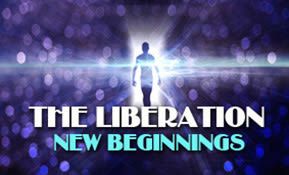
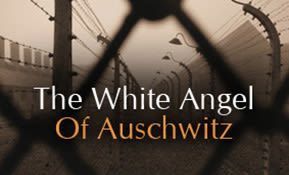
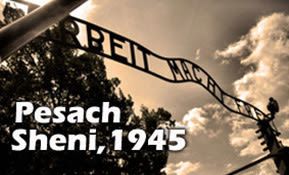

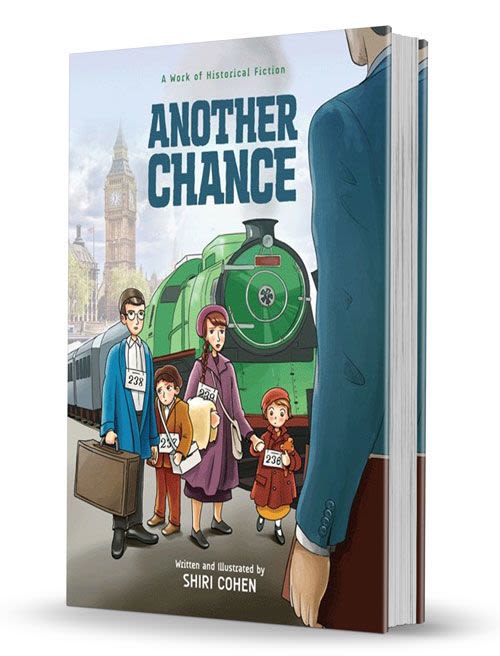
Tell us what you think!
Thank you for your comment!
It will be published after approval by the Editor.